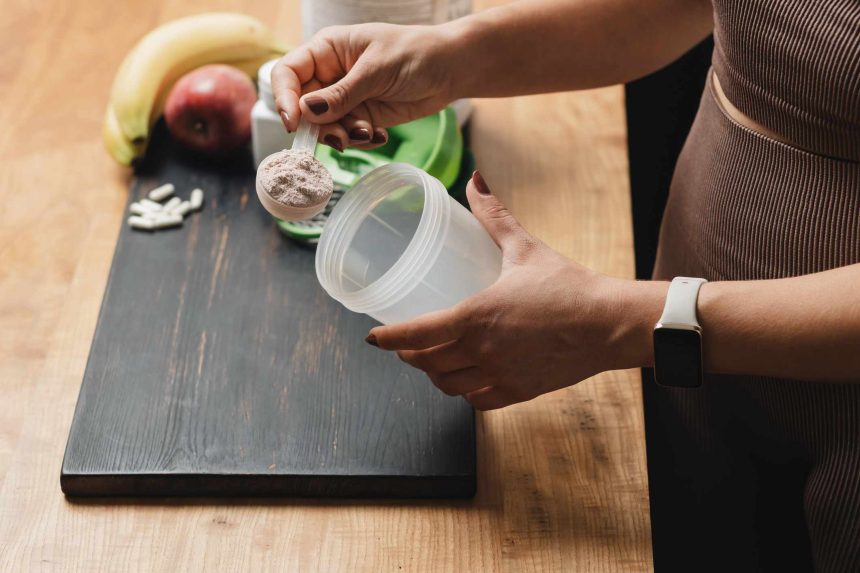Creatine is a compound produced naturally in the body by amino acids. About 95% of this compound can be found in the skeletal muscle. You can also get creatine by eating foods like red meat and seafood.
This compound helps produce energy for the muscles. It’s commonly used by strength and power athletes and bodybuilders who need an extra energy boost to maximize their performance or support muscle growth.
In addition to its ability to improve exercise performance, creatine may also aid weight loss and decrease body fat percentage.
The specific mechanisms by which creatine might directly cause weight loss are not fully understood or consistently supported by research. However, some studies have found that creatine may support weight loss by enhancing your body’s ability to burn fat by increasing heat production in fat cells.
Since creatine increases thermogenesis (heat production) in fat cells, combining creatine supplementation and resistance training may be more effective for fat loss than resistance training alone.
Creatine can promote weight loss by decreasing the production of triglycerides (a type of fat stored in the body), which reduces the overall buildup of fat in your body.
Creatine can also aid weight loss directly by increasing energy use in fat tissues—particularly brown fat cells, which help regulate temperature and burn fat.
Creatine may also work indirectly to help you lose weight by:
- Increasing lean muscle, which elevates the resting metabolic rate, causing the muscle to burn more calories at rest
- Boosting overall energy expenditure, allowing you to burn more calories throughout the day
There are not enough studies to prove that creatine is effective for weight loss. If you want to lose weight with medications, you may want to try options approved by the United States Food and Drug Administration (FDA).
There is also no evidence to suggest that creatine helps in appetite suppression. However, here are some benefits of creatine for people trying to lose weight:
Preserves Muscle Mass During “Cutting”
Cutting is a process used by athletes who plan to shed body weight. It involves eating at a calorie deficit to lose body fat while trying to maintain muscle mass.
Studies show that creatine can be used during a restrictive diet for weight loss to preserve muscle. It may do this by drawing water into the muscle to help protect the muscle fibers from damage and atrophy (muscle loss or thinning).
Enhances Weight Loss With Exercise
Some research suggests that using creatine alongside resistance training helps people lose more body fat percentage and body fat mass. This was especially true for people 50 and older.
However, the research on creatine’s effect on fat mass is mixed. Some studies found no significant impact, while others showed minimal or no effect.
In addition to its potential weight loss properties, creatine may also help:
- Enhance muscle strength
- Improve recovery after exercise
- Increase tolerance for intense physical activity
- Reduce the risk of falls, preventing fractures—particularly for older adults
- Minimize bone loss
- Reduce muscle damage during training
Several types of creatine are available on the market, including creatine monohydrate, creatine ethyl ester, creatine nitrate, creatine citrate, and magnesium creatine chelate.
Creatine monohydrate is the most researched form of creatine, and evidence shows it is reliably safe and effective. Other forms of creatine are less well-studied, and their safety profiles remain uncertain.
There is no recommended dose of creatine monohydrate specifically for weight management. However, it has been found that 5 grams of creatine can be used up to four times a day to increase creatine stores. Some athletes use a higher starting dose of up to 20 grams daily for the first week, followed by a lower maintenance dose of about 3-10 grams.
If you’re using creatine to support weight loss alongside your workouts, there’s no perfect time to take it. You can effectively use creatine before, during, or after your workout.
Creatine temporarily pulls water into the muscle, which can make you feel bloated or like you are gaining weight. This is just water weight, and its effects are temporary.
It is generally recommended that you stay properly hydrated while taking creatine to minimize the temporary effects of water retention and other side effects.
Creatine supplements are available as gummies, powders, liquids, tablets, and capsules, and no evidence suggests that one form is more effective than another. If you dissolve creatine tablets in water, consume them immediately; creatine degrades rapidly in water.
Studies show that creatine supplementation is generally safe and well-tolerated when used short-term, especially at recommended dosages (3-5 grams daily for up to 12 weeks or a starting dose of 20 grams up to seven days).
Some evidence suggests creatine may also be safe for long-term use, up to 30 grams daily for five years.
Creatine may not be for everyone. Do not use creatine if:
- You are pregnant or breastfeeding
- You have kidney disease
- You are diagnosed with bipolar disorder
- You have Parkinson’s disease
Although research is inconclusive, some studies show creatine may worsen symptoms of mania and also make kidney disease worse in people who have kidney disease. It’s important to discuss with your healthcare provider how creatine may affect your health before using this supplement, especially if you have any underlying conditions.
If you’re looking to manage your weight, discuss your options with your healthcare provider to ensure that supplements are a safe and effective choice for you.
Side Effects
You might experience the following side effects when using creatine:
- Headaches
- Dehydration
- Heat intolerance
- Upset stomach
- Muscle stiffness
- Muscle cramps
There have also been reports of more severe side effects of creatine, like seizures. If you experience seizures or are severely hydrated, please talk to a healthcare provider.
While there is no sufficient research to support the effectiveness of creatine in aiding weight loss, creatine may offer some benefits for weight management, both directly and indirectly.
Creatine may cause weight loss by increasing the burning of fat cells, reducing the storage of triglycerides, and increasing the energy your fat cells use. It may also help improve your lean muscle mass and boost your body’s energy expenditure.
Creatine supplementation is generally safe, but consult your healthcare provider if you notice any side effects, like headaches, dehydration, or muscle cramps.




